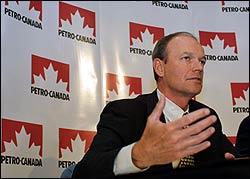Petro-Canada profit better than expected. Company may scale back oil-sands project--Stock price dips 94 cents to $47.60 as TSX index eases
Apr. 30, 2003. 01:00 AM
 Petro-Canada chief executive Ron Brenneman had good news for shareholders at the annual meeting in Calgary yesterday after higher oil prices swelled first quarter profit more than sixfold.
JEFFREY JONES
REUTERS NEWS AGENCY
CALGARY—Petro-Canada's first-quarter profit surged more than sixfold as the country's Number 3 oil producer and refiner reaped rewards of soaring oil prices, a big jump in output and the strong Canadian dollar, it said yesterday.
Petro-Canada chief executive Ron Brenneman had good news for shareholders at the annual meeting in Calgary yesterday after higher oil prices swelled first quarter profit more than sixfold.
JEFFREY JONES
REUTERS NEWS AGENCY
CALGARY—Petro-Canada's first-quarter profit surged more than sixfold as the country's Number 3 oil producer and refiner reaped rewards of soaring oil prices, a big jump in output and the strong Canadian dollar, it said yesterday.
But the stock fell nearly 2 per cent as Petro-Canada revealed it had delayed spending on a key part of its oil-sands strategy and had suffered some exploration setbacks.
The company said preliminary engineering work on retooling its Edmonton refinery to handle new Alberta oil-sands output determined costs would be much higher than hoped.
That prompted it to postpone some of the spending it budgeted this year for detailed engineering, the company said.
"Instead, management will evaluate possible changes to the project's scope, staging, and technology to improve economics. Petro-Canada expects to be in a position to decide on how to proceed toward the end of the year," it said.
Shares in Petro-Canada, known for its national chain of gas stations and exploration and production at home and in the North Sea, North Africa and South America, fell 86 cents to $47.68 in Toronto despite the huge first-quarter profit.
The company earned $584 million or $2.18 a share, up from a year-earlier profit of $88 million, or 33 cents.
Excluding gains from the effect of the strong Canadian currency on its U.S. dollar debt and proceeds of asset sales, earnings were $490 million, or $1.86 a share, beating an average estimate among analysts polled by Thomson First Call by 2 cents a share.
Peters & Co. Ltd. analyst Wilf Gobert said it could be argued that Petro-Canada beat the Street by a much wider margin because operating earnings included a $46 million writedown of assets in Kazakhstan that it has marked for sale.
Cash flow, giving a glimpse into an oil company's ability to fund development, more than tripled to $991 million, or $3.75 a share, from $287 million, or $1.09 a share.
With the major jump in profit, Petro-Canada joined its global industry rivals in benefiting from oil prices that surged 55 per cent as markets feared supply disruptions in the leadup to the U.S.-led war in Iraq while a strike in OPEC member Venezuela dragged on.
Oil firms also enjoyed natural gas prices that more than doubled.